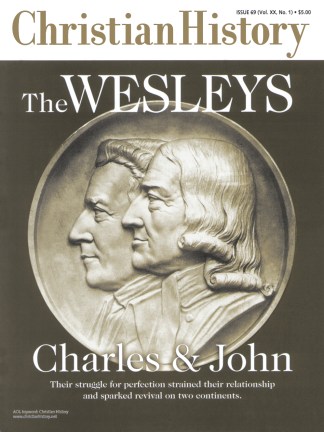In this series

1703 John Wesley born
1707 Charles Wesley born
1709 John rescued from fire at Epworth rectory
1714 John admitted to Charterhouse School
1720 John begins studies at Christ Church College, Oxford
1725 John ordained a deacon
1726 Charles enters Christ Church; John elected a fellow at Lincoln College, Oxford
1729 Charles founds Holy Club
1735 Samuel Wesley dies; John and Charles leave for Georgia
1736 Charles returns to England
1737 John flees America after relationship with Sophy Hopkey fails
1738 May 21: Charles finds himself "at peace with God"
May 24: John feels his heart "strangely warmed"
1739 Following Whitefield's example, John preaches outdoors
1742 Brothers establish orphanage and Sunday school
1747 Charles meets Sally Gwynne; John publishes Primitive Physick
1749 Charles breaks up John's relationship with Grace Murray; John officiates at Charles's wedding
1751 John marries Mary Vazeille
1755 John and Mary separate
1756 Charles's last nationwide preaching tour
1757 The first of Charles's three surviving children, Charles, Jr., born
1765 Charles stops regularly attending Methodist annual conferences
1775 John publishes A Calm Address to Our American Colonies
1780 John publishes the Collection of Hymns for the Use of the People Called Methodists
1788 Charles dies
1791 John dies
The Methodist Movement
1714 George Whitefield born
1730 Holy Club member William Morgan urges visitation ministry to ill and imprisoned
1732 Whitefield enrolls at Oxford; Holy Club blamed for Morgan's death, attacked in Fog's Weekly Journal
1733 Whitefield joins Holy Club
1735 Whitefield becomes first Methodist to experience "full assurance of faith"
1736 Whitefield leads Holy Club
1738 John Wesley visits Herrnhut
1739 Whitefield begins preaching outdoors, makes first trip to America
1740 Methodists break with Moravians in London, begin meeting at the Foundery
1741 Calvinist/Arminian debate between Whitefield and John Wesley; Thomas Maxfield, a layman, begins preaching without permission
1743 John Wesley issues An Earnest Appeal to Men of Reason and Religion, an apologetic for Methodism
1744 First Methodist annual conference
1749 John Wesley publishes A Plain Account of the People Called Methodists
1753 Whitefield publishes hymnal
1763 Maxfield joins enthusiast sect, claims "angelic" perfection
1766 John Wesley offers A Plain Account of Christian Perfection
1768 Oxford administration expels six Methodist students; Methodist chapel opens in New York
1769 Whitefield makes seventh and final trip to American colonies
1770 Whitefield dies
1771 Francis Asbury sails to America
1776 Methodists in America number 4,921
1778 The Arminian Magazine debuts
1784 John Wesley names Asbury and Thomas Coke "superintendents" of work in America, issues prayer book, The Sunday Service of the Methodists in North America
1787 Richard Allen starts the Free African Society, precursor to the African Methodist Episcopal Church
1788 John Wesley rebukes Asbury and Coke for calling themselves "bishops"
Culture, Religion, and Politics
1703 Jonathan Edwards born
1707 Isaac Watts' Hymns and Spiritual Songs published; J. S. Bach's first work published; Act of Union unites England and Scotland as Great Britain
1714 Hanoverian George I becomes king of England
1715 First Jacobite uprising in Scotland seeks to restore Catholicism in Britain
1722 Herrnhut, a Moravian settlement in Saxony, founded by Count Nikolaus von Zinzendorf
1728 William Law's A Serious Call to a Devout and Holy Life published
1732 George Washington born
1733 Colonel James Oglethorpe founds Savannah, Georgia
1740-41 Great Awakening peaks
1741 Jonathan Edwards preaches "Sinners in the Hands of an Angry God"
1742 First performance of G. F. Handel's Messiah
1756 Amadeus Mozart born
1760 George III becomes king of England
1770 Ludwig von Beethoven born
1775 American Revolution begins
1787 William Wilberforce begins crusade against slave trade in Britain
1789 French Revolution
Copyright © Christianity Today/Christian History magazine. Click here for reprint information on Christian History.










